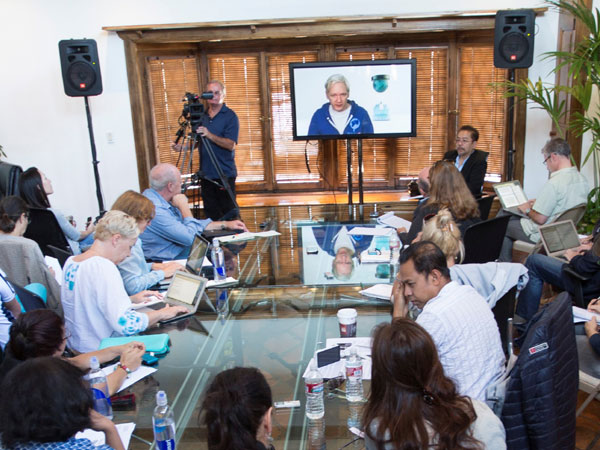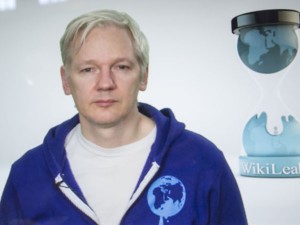500 days at Ecuadorian Embassy: A ‘difficult’ life for WikiLeaks founder

PDI and Inquirer.net’s Los Angeles correspondent Ruben V. Nepales moderating (right, beside the monitor) the press conference with Julian Assange via Skype at the Hollywood Foreign Press Association’s headquarters in West Hollywood, California. PHOTO COURTESY OF HOLLYWOOD FOREIGN PRESS ASSOCIATION
LOS ANGELES – “It’s difficult to wake up over 500 days and see the same walls,” said Julian Assange, the controversial founder of WikiLeaks in a world exclusive press conference via Skype from the Ecuadorian embassy in London where he has been holed up since June 19 last year.
In an unprecedented interview “get,” Assange talked about a wide array of topics with about 37 members of the Hollywood Foreign Press Association (HFPA) in the Golden Globe Award giving body’s headquarters in West Hollywood, California. The 42-year-old heads WikiLeaks, the organization that has released hundreds of thousands of classified documents with far-reaching implications around the world, including the Philippines, where leaks offered new revelations about atrocities committed under the Marcoses’ martial law regime.
The editor-in-chief of WikiLeaks is subject to a European arrest warrant (EAW) following the sexual -misconduct accusation of two women while he was in Sweden in 2010. After Assange lost in his appeal before the Supreme Court of the United Kingdom to dismiss the enforcement of the EAW, he failed to surrender to his bail. With the UK authorities considering Assange as having absconded, he sought political asylum in the Ecuadorian embassy and his request was granted.
Assange said that Ecuador granted him political asylum because of the US’ investigation into WikiLeaks, which involves a grand jury in Alexandria, Virginia.

Julian Assange in world exclusive press conference via Skype from the Embassy of Ecuador in London, UK. PHOTO COURTESY OF HOLLYWOOD FOREIGN PRESS ASSOCIATION
Metropolitan Police Service officers have remained outside the embassy and are ready to arrest Assange if he leaves the building. UK authorities plan to extradite Assange to Sweden. Assange and his lawyer in the UK, Mark Stephens, maintain that if the editor is extradited to Sweden, he will subsequently be extradited to the US to face charges of leaking highly classified American diplomatic cables and military documents.
Assange, looking boyish with a short haircut, wore a blue hooded sweater that bore WikiLeaks’ logo of an hourglass with one globe leaking to the second. While he lamented waking up to the tiny office room that was converted into his “home,” Assange claimed, “…On the other hand, I am doing good work. I have no time for anything else now but work. It’s a bit of a counter-productive maneuver to trap me here because what else can I do but work? I have a very capable and loyal staff. We have a lot of supporters around the world and people who believe in what we do and want to see if it continues.”
The 2009 Amnesty International UK Media Award (New Media) recipient and one of Time’s 100 most influential people in 2011 said that he was concerned about the “developing prison” outside the embassy. “Intellectually, although I’m trapped in these walls, (what is happening) with our people outside today—that to me is important,” said the man who makes the final decision on what WikiLeaks publishes on its website. “That’s why what’s happening outside is much more important than my desire to get outside. What will I be going into? And what would my organization go into and what would we all get into?
“To a degree, while I am—if you like—imprisoned here, there’s a developing prison where you are living as well. It would be pretty bad when I finally get out of here, to actually see that it’s better here than out there. At least in here, this is a place where there are no sudden raids by police, where there is a rule of law, and not an arbitrary breakdown as there are in many countries now.”
Ecuador is reportedly considering turning to the International Court of Justice to resolve Assange’s case. While Assange declined to comment specifically on the possibility of the world court making a ruling on his case, he commented in broader terms. “When your profile is sufficiently raised, where it’s clear that you have very powerful enemies or friends, then every decision takes on a political character,” he said. “That’s what we have seen here in the United Kingdom, with the way that I have been detained, without a charge, in any country, for more than three years—almost 500 days in the embassy, where the British government admits to spending more than 10 million dollars on the surveillance of me at this embassy. This is a figure that has been condemned, even by the Conservative Lord Mayor of London, Boris Johnson.”
On his life in seclusion, Assange remarked, “The embassy staff are like family now (to me). We’ve gone through a lot together. There was a siege of the embassy in August of last year after I’d been here for two months. When it was rumored that the Ecuador government was going to grant me political asylum, that caused international outrage. The UK was completely isolated…The OAS, the Organization of American States, condemned the United Kingdom.”
“But can you imagine inside the embassy?” he asked aloud. “Several dozen police descended at three in the morning, including at least one on a rope coming down the wall. Those (incidents) produce a sort of camaraderie…So the people at the embassy have become quite close (to each other). We understand that we are all in this together.”
“There are some staff who have been working here for nearly 20 years in this embassy,” Assange added. “Of course, the working environment in the embassy has changed a lot. There is still police surrounding the embassy and intelligence observations of everyone who comes in and out. It’s a difficult environment for the staff. Yes, we have lunch together and celebrate people’s birthdays and other details that I don’t want to go into because of the security situation.”
When a reporter asked Assange if he speaks Spanish, he broke into a sly smile and replied, “I found in investigative journalism that it’s always best that if you have any language skills, it’s always best not to admit them.”
In his remarks to the assembled journalists, Assange claimed, “The United States has become a place where people seek asylum, not to, but from…journalists live in exile away from the United States.” Assange cited Glenn Greenwald, an American journalist, whom he describes as “a chief journalistic supporter, now in exile in Brazil.” He also mentioned journalist-filmmaker Laura Poitras, originally from New York, who is now in exile in Germany.
On WikiLeaks putting civilians in danger as a result of its leaks, Assange said, “The US said that not even a single person has come to physical harm because of our publications. It said so under oath in the Bradley (now Chelsea) Manning proceedings earlier this year…The real harm is caused by war and torture.”
And on the 35-year prison sentence meted out to Manning, the former US Army soldier who leaked hundreds of thousands of documents from the Iraqi and Afghan Wars, Assange said, “The minimum sentence is a tactical victory by the defense team who worked extremely hard and by Chelsea Manning supporters. However, it is an outrage that an alleged media source, and that is all that is alleged, could be sentenced at all, let alone for 35 years for allegedly committing espionage. This is a linguistic abuse. There is no allegation that Private Manning sold any information. There is no allegation that he intended to give any information to a foreign state. There cannot be any allegations in espionage.
“And yet in this case, we see an alleged media source being convicted for espionage as a result of simply informing the American people what was going on in their name and on a number of different abuses in Iraq, Afghanistan and elsewhere. No allegation that Private Manning was motivated by anything other than the desire to help others.”
Asked if he ever has moments of weakness, the Queensland, Australia, native emphasized, “No, there is never a day. When I was in solitary confinement (in 2010 when he was in UK custody on the sexual charges filed in Sweden), I did consider, have I weighed the various forces correctly? I concluded that I believe I have. I was released after some 10 days in solitary confinement without charge.”
Assange explained his “best case scenario.” “My focus of attention is on the US case, the continuing grand jury investigation. That is what I have received full political asylum in relation to. I assume the Swedish case will disappear in due course. That doesn’t alter the situation for me here in relation to leaving the embassy.”
Assange said that in hindsight, he wouldn’t have done things differently. “In any complex matter, if you are going to work for a brute cause, many small, tactical decisions go one way or another,” he said. “But in all the major decisions, no, I wouldn’t have done it differently. The major decisions are mostly forced moves. They reflect the underlying character of the environment that we are dealing with or the assets that we have available or the number of people that we have available.
“If we could manage to have a billion dollars’ worth of capital, and 10,000 people, we could start instantly. Of course, that would give us vulnerability. But within the constraints that we have, we have very good people. All the major decisions made, I believe, were correct. I can’t see a way we could have done things differently.”